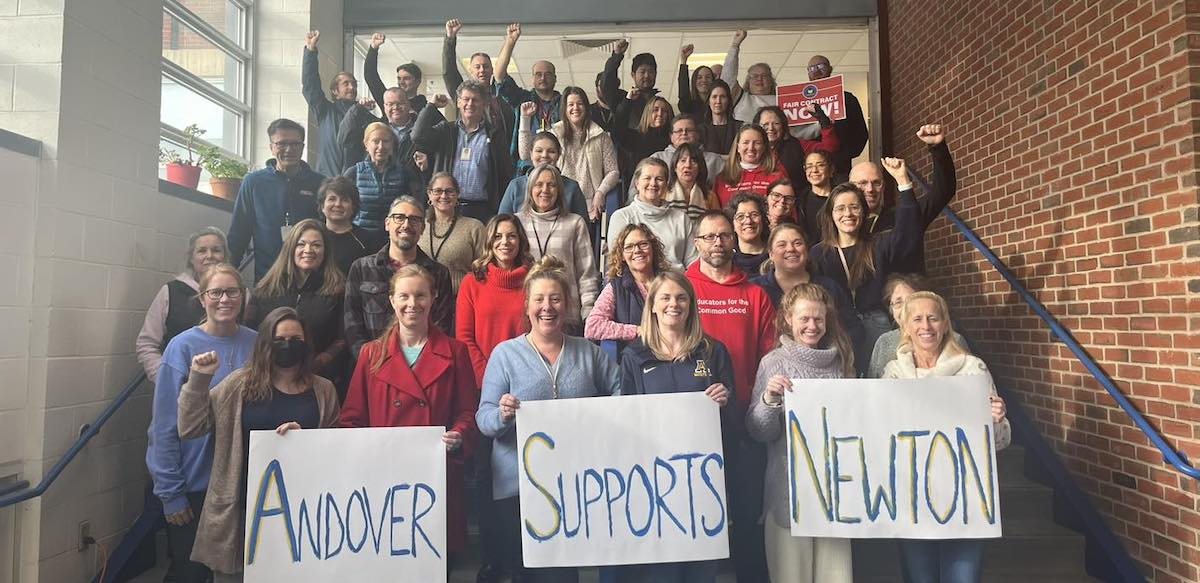Teaching Each Other to Strike

Andover, Massachusetts, educators sent support to Newton Teachers Association members who struck in January for 11 days. Massachusetts teachers are teaching each other to strike. Photo: Newton Teachers Association.
Recently I heard members of the Newton Teachers Association recount the path to their 11-day January strike. The audience at the Massachusetts Teachers Association winter skills conference gave them a standing ovation.
In the past 20 months, seven MTA locals have voted to strike and six have walked out. They’ve won significant raises for the lowest-paid workers, paid family and medical leave, more social workers, and educator control over planning time.
All the strikes were illegal, and the courts issued fines in most cases. Newton teachers were fined $625,000, for example.
Any strike by public sector workers is against the law in Massachusetts. Supporting them is illegal, too. The law reads: “No public employee or employee organization shall induce, encourage or condone any strike, work stoppage, slowdown or withholding of services by such public employees.”
DEFYING THE LAW
When Malden and Haverhill educators went on strike in the fall of 2022, a practice began among other MTA locals to explicitly defy the law by signing a statement that said they:
“Condone the withholding of their labor and encourage members of [name of the striking local] to remain steadfast in their demands for a fair and just contract. Our unions stand ready to offer whatever support may be needed for their strike effort, including picketing and inducing support from other unions.”
While only a handful of locals signed that first statement of support, now dozens are signing on as soon as a strike is called. And locals have been contributing to each other’s strike funds. In Woburn, parents held a cookie sale to help cover the fines. One person paid $100 for a cookie.
So how did we get here? Certainly it matters that for the past 10 years the MTA has been led by members of Educators for a Democratic Union, a reform caucus. But what are the actual mechanisms by which this strike wave has grown?
It’s pretty simple, actually. Members are teaching each other.
The recent wave started in the fall of 2019, when Dedham educators struck. Members walked out on a Friday and had a settlement by Monday. Other locals took notice and reached out to Dedham leadership.

SUPPORT LABOR NOTES
BECOME A MONTHLY DONOR
Give $10 a month or more and get our "Fight the Boss, Build the Union" T-shirt.
In the Merrimack Valley, north of Boston, members and leaders held informal meetings across locals about their contracts, bargaining, and how to build power to win.
After Brookline struck in May 2022, leaders there shared their lessons, which helped Haverhill and Malden plan.
Melrose voted to authorize a strike (January 2023) and had a settlement within 24 hours—everything the union had demanded. Those educators had been talking to their counterparts in Haverhill and Malden.
Woburn (February 2023) learned and added knowledge as educators there built community support and, after winning, turned that into a defeat for the mayor in the next election.
Teachers in other locals were organizing in parallel, building unseen power that never culminated in a strike vote only because the union won big before a vote was necessary.
CONFIDENCE AND JOY
What did members teach one another? How to bring more members into the bargaining process. How to listen and democratize decision-making. How to collect and track information about what members are saying in one-to-ones and who is participating in actions. How to acknowledge and learn from mistakes.
These lessons were taught in Zoom meetings, phone calls, and visits to each other’s bargaining committees, and by joining bargaining as silent witnesses.
Across Massachusetts, rank-and-file union members are also learning how to overcome fear and demand what once seemed impossible—when they show up at each other’s picket lines and rallies, contribute to strike funds, and see the confidence and joy of their striking union siblings.
And the tone is clear: we’re just getting started.




